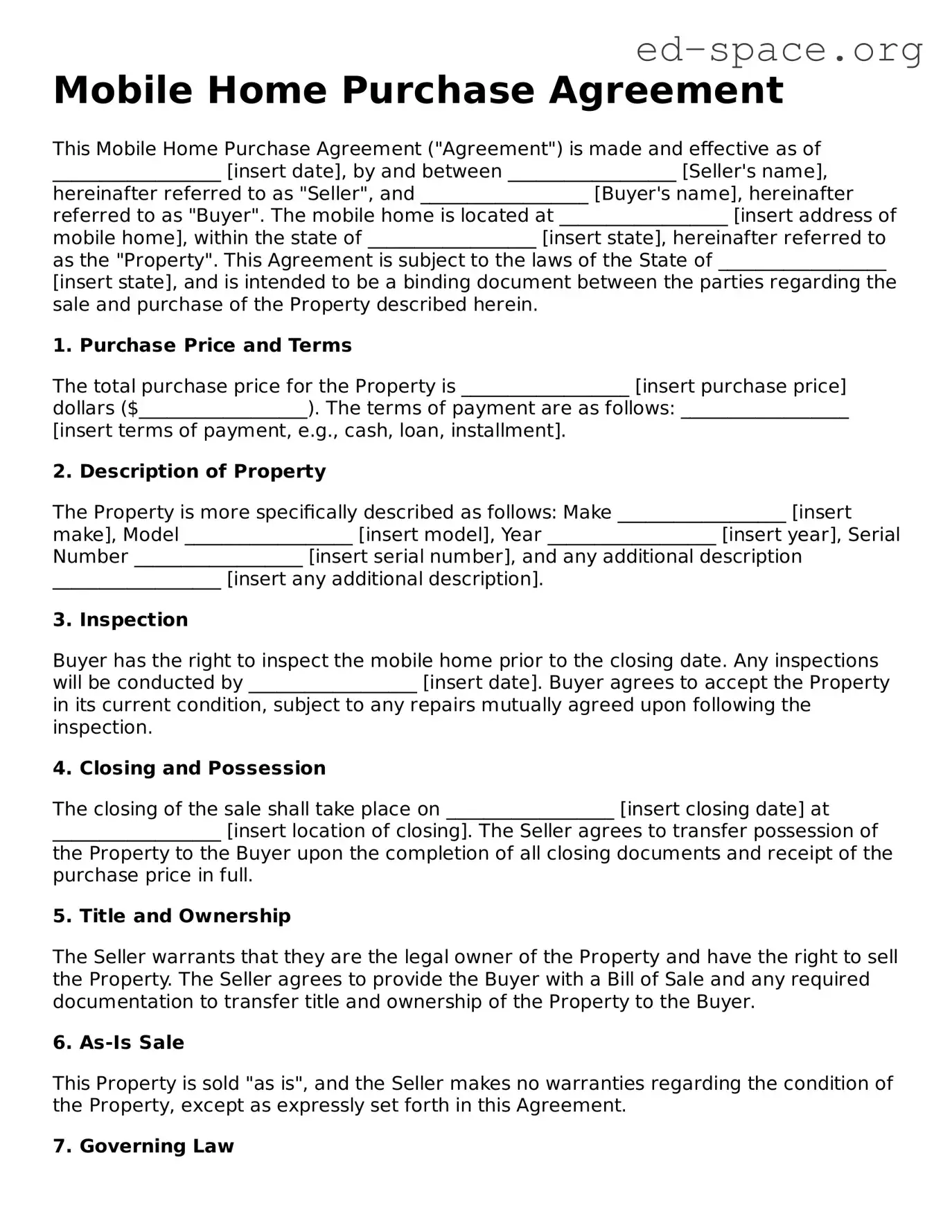What is a Mobile Home Purchase Agreement?
A Mobile Home Purchase Agreement is a legally binding contract between a buyer and seller for the purchase and sale of a mobile home. This document outlines the terms and conditions of the sale, including purchase price, financing terms, and any contingencies that must be met before the sale is finalized.
Who needs to sign the Mobile Home Purchase Agreement?
Both the buyer and the seller must sign the Mobile Home Purchase Agreement. Their signatures indicate that they agree to the terms and conditions outlined in the agreement.
What should be included in a Mobile Home Purchase Agreement?
The agreement should include details such as the names and addresses of both parties, a description of the mobile home (including make, model, year, and serial number), the purchase price, deposit amount, financing terms, an inspection clause, closing date, and any other conditions or contingencies that the sale is subject to.
Is an inspection necessary before purchasing a mobile home?
While not always legally required, having an inspection done before purchasing a mobile home is highly recommended. An inspection can reveal potential issues with the home that could affect its value or livability. Including an inspection clause in the agreement allows the buyer to negotiate repairs or back out of the sale if significant problems are discovered.
What happens if the buyer or seller breaks the agreement?
If either party fails to fulfill their obligations under the agreement, they may be considered in breach of contract. The consequences of breaching the agreement depend on its terms and conditions, which typically include provisions for handling disputes. This may involve forfeiting deposits, paying damages, or taking specific disputes to arbitration or court.
Can the purchase price be negotiated after the Mobile Home Purchase Agreement is signed?
Generally, the purchase price is fixed once the Mobile Home Purchase Agreement is signed by both parties. However, the agreement may include contingencies that allow for adjustments to the price, such as findings from an inspection or appraisal. Any changes to the purchase price after the agreement is signed must be agreed upon by both the buyer and seller in writing.
How does financing affect the Mobile Home Purchase Agreement?
Financing is often a key component of the Mobile Home Purchase Agreement. The agreement should clearly state the financing terms, including the loan amount, interest rate, loan duration, and any conditions related to financing approval. If the buyer fails to secure financing according to the terms specified in the agreement, it may allow the seller to terminate the contract or extend the timeframe for financing approval.
What contingencies are commonly included in Mobile Home Purchase Agreements?
Common contingencies include financing approval, the sale of the buyer’s current home, satisfactory inspection results, and the ability to insure the mobile home. These contingencies protect both the buyer and seller by allowing either party to back out of the contract if certain conditions are not met.
What is the difference between a Mobile Home Purchase Agreement and a Bill of Sale?
A Mobile Home Purchase Agreement outlines the terms and conditions of the sale before it is finalized, including price, financing, and contingencies. A Bill of Sale is a document provided at the time of sale that transfers ownership of the mobile home from the seller to the buyer. It serves as proof of purchase and ownership.
How is a Mobile Home Purchase Agreement finalized?
A Mobile Home Purchase Agreement is finalized when all conditions and contingencies outlined in the agreement have been met, both parties have signed the agreement, and the purchase price has been paid in full. After closing, the seller provides the buyer with a Bill of Sale and any other necessary documents to transfer ownership of the mobile home.
